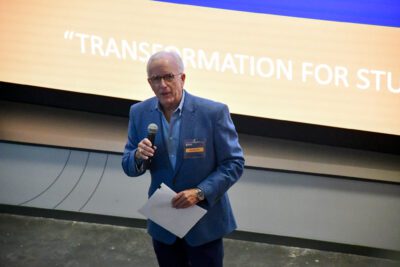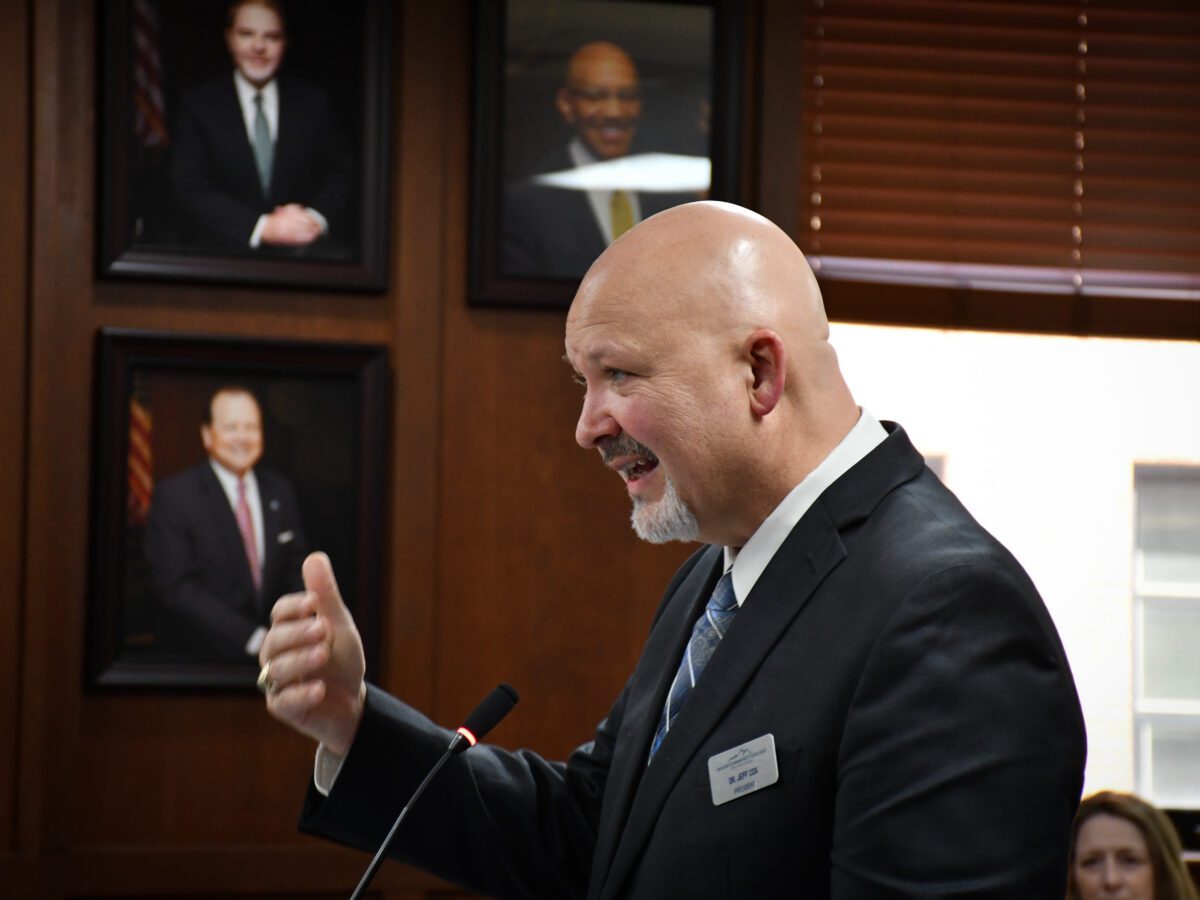
The North Carolina Community College System (NCCCS) has launched the search for its next president, the State Board of Community Colleges announced at the end of its Friday meeting. The nationwide search for Dr. Jeff Cox’s successor as president will be led by Board members and an advisory council of seven leaders in higher education, business, and government.
“Our goal is simple but significant,” Board Chair Tom Looney said in a system press release. “We will identify a transformative leader who can move our System at the speed of business and innovation — leveraging the collective strength of our 58 colleges and the communities they serve. This process will be transparent, collaborative, and focused on results.”
![]() Sign up for the EdDaily to start each weekday with the top education news.
Sign up for the EdDaily to start each weekday with the top education news.
The search comes after Cox announced his retirement at the beginning of the school year, effective June 30, 2026. Cox has served as the system’s 11th president since June 2023, in a decade marked by leadership transitions for the system. Since August 2015, when then-President Scott Ralls resigned after a seven-year tenure, seven leaders have held the system’s leading role (with one of those leading twice).
“Dr. Cox stepped up at a critical moment and brought much-needed stability and experience to the system, serving with heart,” said Looney in a press release after Cox announced his retirement. “We thank him for his service and unwavering commitment to our colleges, students, and communities across North Carolina.”
John Kane, vice chair and co-chair of the presidential search committee, highlighted the importance of community colleges for the state economy and the importance of the system’s leader.
“North Carolina’s economic success depends on the strength of our community colleges,” Kane said in the release. “This search will engage business and government leaders statewide to ensure the next President continues modernizing the System, strengthening workforce alignment, and expanding opportunities for every business, industry, and student across our state.”
Looney and Kane will serve as co-chairs of the presidential search and will be joined by other Board members Chaz Beasley, Treasurer Brad Briner, Lisa Estep, and Chris Lumsden.
The Board’s advisory council will include:
- Dr. Amanda Lee, President, NC Association of Community College Presidents;
- Gene Rees, Chair, Board, NC Association of Community College Trustees;
- Chris Chung, CEO, Economic Development Partnership of NC;
- Ward Nye, Chairman & CEO, Martin Marietta;
- Sen. Michael Lee, R-New Hanover, North Carolina Senate;
- Rep. David Willis, R-Union, North Carolina House; and
- Seth Dearmin, Chief of Staff for the North Carolina Governor’s Office.
“We intend to complete this search with both rigor and speed,” Looney said. “It will reflect the very best of this Board, this System, and this State.”
Related reads
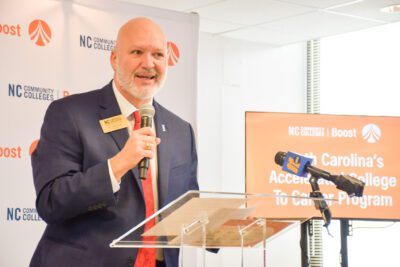
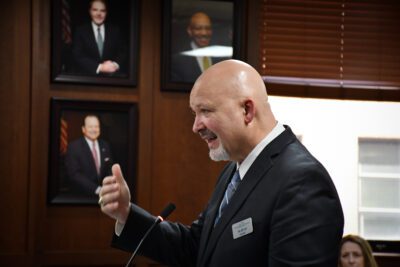
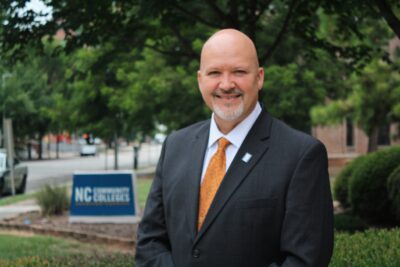
Strategic plan updates
Looney announced the search would be launched on Friday at the tailend of the Board’s October meeting. The two-day meeting highlighted the ongoing strategic planning process for the next four years.
Zach Barricklow, interim vice president of strategic initiatives, presented takeaways from September’s two-day summit, which kicked off the system’s strategic planning process. In a document outlining the Board’s top priorities, Barricklow highlighted the ongoing effort to secure funding for Propel NC, the system’s proposed funding model, and ApprenticeshipNC.
“Our intention with the summit was not to leave it there, but to carry it forward, and build on this momentum and traction,” Barricklow said.
Barricklow said nine items have been identified as most high-priority and will be acted on immediately. Those items are available in this document.
Barricklow also laid out a timeline for the development of the Board’s 2026–29 Strategic Plan. Through January, the Board will set its high-level goals for the plan, followed by a six-month period to determine the plan’s implementation and performance indicators. The Board expects to approve the plan by September 2026.
The strategic plan’s development will now occur in line with two other key timelines for the system: making sure the system’s new president can weigh in, and the legislative short session.
He also said the Board plans to meet with five regional groupings of presidents to get their input throughout October. Takeaways from those conversations will be summarized at November’s committee meeting.
“We want to make sure all co-owners of this strategic plan have an opportunity to be heard and have a stake in it,” said Dr. Dale McInnis, chair of the Board’s strategic planning committee.
ApprenticeshipNC and state and federal funding
The Board also discussed the ongoing stalemates in the federal government shutdown and the approval of a state budget.
Cox said the federal shutdown has not affected the system’s funding streams. However, some colleges have reported issues getting questions answered by federal agencies, and military students are facing economic challenges — especially students at Fayetteville Technical Community College, as military members are missing payments.
During the meeting, members also called attention to the challenges facing ApprenticeshipNC, one of the system’s most popular programs, which is at risk of losing federal funding.
Nearly $22 million in federal grants used to fund 65% of the ApprenticeshipNC program’s operations are set to expire in June 2026, said John Loyack, vice president of economic development.
These grants were anticipated to run out on these timelines. However, the federal government shutdown has caused delays in making modifications to the current grants they have.
“There is no one to answer even if we called,” Loyack said. “That is part of the immediate impact — as we are trying to submit modifications to the grants we have right now, we can’t get responses, because no one is on the other end.
The state’s apprenticeship program reported record growth in its 2024-25 annual report, with 5,241 new apprentices joining the program to reach a total of 16,446 apprentices. There were 555 new high-demand occupations during 2024-25, according to the report, and 1,700 new pre-apprenticeship enrollments.
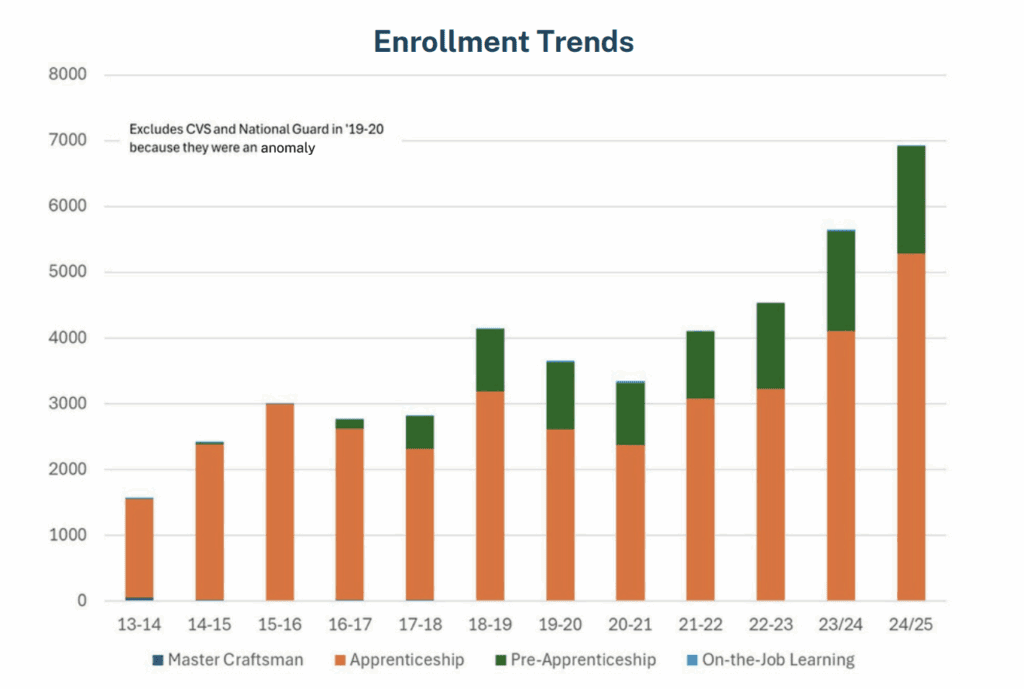
Despite its growth, the expiration of grants has put the program’s momentum “at risk,” the program’s director, Dr. Chris Harrington, said in an Oct. 10 press release.
“It has experienced remarkable growth, fueled by the understanding that a skilled, adaptable, and efficient workforce isn’t just a goal — it’s the competitive advantage of North Carolina,” Loyack said in the release.
Cox said $3 million in state funding is needed to achieve the governor’s Workforce Council goal of doubling apprenticeships, and that he raised this need at the governor’s Oct. 14 education cabinet meeting. The report says that investment would yield over $251 million in future state tax revenue and $2.15 billion in additional wages for its estimated 52,000 completers in the next decade.
“The return on investment in Registered Apprenticeships is clear — for participants, for employers, and for public funding. We have demonstrated what is possible using grant money to fuel our growth,” Harrington said in the press release. “Now is the time to allocate state resources and continue our trajectory.”
You can read the full annual report on the system’s website.
Post-Helene assessment
The Board also heard a report produced by the John M. Belk Endowment on the system’s response to Hurricane Helene and the lessons learned from the state’s 14 impacted community colleges, including six most impacted colleges.
“What can we learn from this natural disaster to help colleges be better prepared for a natural disaster, or when natural disasters occur, how do we recover quickly?” said Dr. Kimberly Gold, the system’s chief of staff.
The report includes three main recommendations:
- Develop a toolkit for disaster preparedness and recovery. The toolkit will include one-page summaries that provide an overview of guiding questions, considerations, and resources, and guidance for best practices in disaster preparation for use in new president’s orientation and as a reference for existing leaders.
- Develop and deliver tabletop exercises to college teams that promote disaster training and preparation. Training exercises will focus on natural disaster planning and preparation. “Training currently exists for active shooter training and other types of emergencies however most current training does not include natural disaster scenarios,” the document says. “Training will be developed in partnership with Emergency Management and Public Safety partners.”
- Develop and document System Office response protocols to include rapid response support teams, onsite presence and visibility, policy flexibility, funding, and advocacy support.
Gold said some of the system’s most helpful decisions and protocols during the recovery process included delivering supplies and Starlink systems to improve internet connectivity, as well as its weekly calls with colleges and its service contract for FEMA support to help colleges apply for disaster aid.
She said the system is already working to document those efforts for future disaster response.
“Even though that was a year ago, there are a lot of recovery efforts left,” Gold said.
Read EdNC’s Hurricane Helene coverage

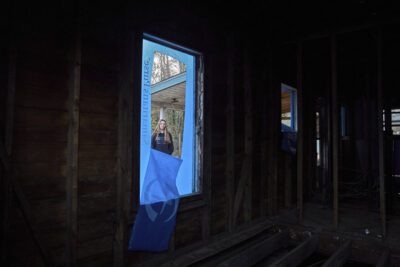
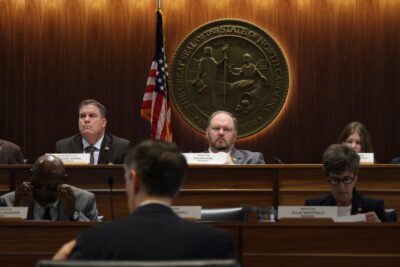
Accreditation changes
Since the Board’s last meeting, Gov. Josh Stein signed House Bill 358, which, among other things, updates accreditation requirements for community colleges and the UNC System.
In 2023, a new law prohibited colleges gaining accreditation through the same accreditation agency in consecutive cycles. That part of the law has been removed, explained Dr. Brian Merritt, senior vice president and chief academic officer. At the time, system and college leaders said the law was burdensome for colleges, as switching accreditors is a lengthy and involved process.
The new law provides colleges with the option to remain with their current accreditor or pursue a different one when the 10-year accreditation cycle ends.
“Accreditation is the gateway to federal student aid to be able to give student loans and award federal Pell grants,” Merritt said. “But really it’s an assurance and integrity check that goes on every day at the colleges.”
All of the state’s community colleges are accredited and in good standing, Merritt said.
DAVE Act
Gold also presented the system’s report in response to the state’s new Division of Accountability, Value, and Efficiency (DAVE) Act. The law requires the state auditor to evaluate state agencies’ long-standing vacancies and other managerial or fiscal practices — essentially the state’s version of the federal Department of Government Efficiency (DOGE).
“If we aren’t filling vacancies, it raises questions about why we have those positions and if those funds could be used in a different way,” Gold explained when asked about the objectives of the DAVE Act.
The System Office was allowed to submit some of the information required on behalf of the state’s 58 community colleges.
The auditor’s office identified five positions that had been vacant for more than six months. One position was filled at the time of the request, two vacancies were due to the expiration of time-limited funding, and the remaining two are being restructured “to meet changing needs of the agency,” according to the report.
The report says that colleges are not state agencies and their budgets do not have a specific number of positions allocated. The System Office has 234 budgeted positions, Gold said, and changes to that number are reported to the Office of State Human Resources.
Education records of minor students
The Board also approved a rule on Friday to comply with a new state law requiring all community colleges to have a clearer process for granting parents access to the education records of their minor students.
Parents currently have rights to the information if the student is in high school, but those rights are transferred to the students in postsecondary courses. Under the new law, changes will apply specifically to students who are dependents, not those who are emancipated. A student’s medical information is not included in the policy, as it is covered by HIPAA, the federal law restricting release of medical information.
In August, the Board discussed the new rule, which requires minor students to complete a consent form “prior to registration in any course.” After the discussion, the Board opened the rule to public comment, though it received none.
The new rule becomes effective on Nov. 1.
You can read the full policy here.
Personnel updates, transfer data, and more
The Board approved a motion from the personnel committee recommending the reelection of Sampson Community College President Dr. Bill Starling.
Other personnel updates included an approved transition performance plan for Cox, and Bill McBrayer, chair of the personnel committee, said the Board also expects to receive a group of presidential candidates for James Sprunt Community College in the “very near future.”
The Board also discussed increases in transfer enrollment across North Carolina. This fall, the UNC System’s 16 universities welcomed 18,719 transfer students, an 8.2% increase since fall 2024, and the highest number on record. Of those, 10,840 students transferred from community colleges.
Board members and system leaders said they want to make sure students not only transfer, but are successful. Data discussed last week shows that students who enrolled in fall 2023 with an associate degree transferred and performed as well or better as students who started off at the institution.
The Board also approved allocations for the NC Career Coach program. Part of the funds will be used to fund an impact evaluation of the program, which places community college career counselors in high schools to help students determine their career goals and how community colleges would help them achieve them.
Board members also voted to allocate $828,813 to correct a calculation error in the funding given to colleges for the start-up and expansion of health care training programs. Alamance Community College will receive an adjusted allocation of $255,785 and Asheville-Buncombe Technical Community College will receive $573,028 from the $35 million in ARPA Temporary Savings Funds the General Assembly allocated for the program in 2023.
Finally, the Board’s accountability and audit committee also presented a report on an audit of colleges’ financial statements, as well as a cybersecurity update highlighting fraudulent student accounts and applications.
The Board’s next meeting is scheduled for Nov. 20-21.
Editor’s note: The John M. Belk Endowment supports the work of EdNC.
Recommended reading


